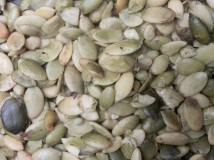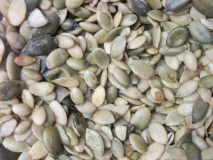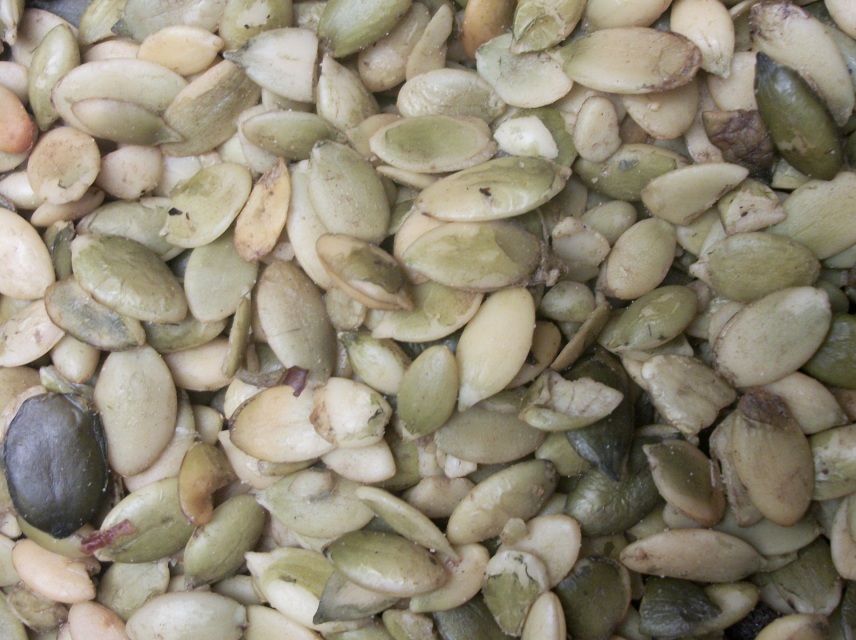SKU:
PEPITAS ROASTED SALTED
$6.50
6.5
28.99
$6.50 - $28.99
Unavailable
per item
DELICIOUS AND NUTRITIOUS PEPITAS ROASTED AND SALTED TO A CRUNCHY PERFECTION !
WE OFFER SEVERAL HAND MADE BLENDS USING DELICIOUS PEPITAS !!!
Pumpkin seeds have long been valued as a source of the mineral zinc, and the World Health Organization recommends their consumption as a good way of obtaining this nutrient. If you want to maximize the amount of zinc that you will be getting from your pumpkin seeds, we recommend that you consider purchasing them in unshelled form. Although recent studies have shown there to be little zinc in the shell itself (the shell is also called the seed coat or husk), there is a very thin layer directly beneath the shell called the endosperm envelope, and it is often pressed up very tightly against the shell. Zinc is especially concentrated in this endosperm envelope. Because it can be tricky to separate the endosperm envelope from the shell, eating the entire pumpkin seed—shell and all—will ensure that all of the zinc-containing portions of the seed will be consumed. Whole roasted, unshelled pumpkin seeds contain about 10 milligrams of zinc per 3.5 ounces, and shelled roasted pumpkin seeds (which are often referred to pumpkin seed kernels) contain about 7-8 milligrams. So even though the difference is not huge, and even though the seed kernels remain a good source of zinc, you'll be able to increase your zinc intake if you consume the unshelled version. While pumpkin seeds are not a highly rich source of vitamin E in the form of alpha-tocopherol, recent studies have shown that pumpkin seeds provide us with vitamin E in a wide diversity of forms. From any fixed amount of a vitamin, we are likely to get more health benefits when we are provided with that vitamin in all of its different forms. In the case of pumpkin seeds, vitamin E is found in all of the following forms: alpha-tocopherol, gamma-tocopherol, delta-tocopherol, alpha-tocomonoenol, and gamma-tocomonoenol. These last two forms have only recently been discovered in pumpkin seeds, and their health benefits—including antioxidant benefits—are a topic of current interest in vitamin E research, since their bioavailability might be greater than some of the other vitamin E forms. The bottom line: pumpkin seeds' vitamin E content may bring us more health benefits that we would ordinarily expect due to the diverse forms of vitamin E found in this food.WE OFFER OUR PEPITAS WITH STARWBERRIES, BLUEBERRIES, AND OTHER DRIED FRUITS !!! FOR A HEALTHY ADDITION TO YOUR DAILY DIET !
By eating nuts and having a healthy diet low in saturated fats and high in fiber is a good start. Nuts contain fatty acids, unsaturated fats, and packed with protein !
If there was a “bad” aspect to nuts it is they have a lot of calories, but many of the health benefits may out way this part ! when eaten with a healthy diet
Is the consumption of nuts good for the heart ?
Although a great deal of research suggests that nuts can benefit heart health and reduce the risks of dying early from heart disease and other causes, the evidence is still inconclusive. But, unless you're allergic to nuts, there's no real danger in eating nuts, so you can certainly include nuts as part of your heart-healthy diet.
One way nuts may help your heart health is by lowering the low-density lipoprotein (LDL, or "bad") cholesterol levels. LDL plays a major role in the development of plaque that builds up on the blood vessels. Eating more nuts has also been linked to lower levels of inflammation linked to heart disease.
Nut consumption may also help in the reducing the risks that are associated with blood clot development and those could lead to heart attacks .
Nuts contain elements that could help with heart health !
Aside from being tasty nuts contain some of the following which could help with heart health :
If there was a “bad” aspect to nuts it is they have a lot of calories, but many of the health benefits may out way this part ! when eaten with a healthy diet
Is the consumption of nuts good for the heart ?
Although a great deal of research suggests that nuts can benefit heart health and reduce the risks of dying early from heart disease and other causes, the evidence is still inconclusive. But, unless you're allergic to nuts, there's no real danger in eating nuts, so you can certainly include nuts as part of your heart-healthy diet.
One way nuts may help your heart health is by lowering the low-density lipoprotein (LDL, or "bad") cholesterol levels. LDL plays a major role in the development of plaque that builds up on the blood vessels. Eating more nuts has also been linked to lower levels of inflammation linked to heart disease.
Nut consumption may also help in the reducing the risks that are associated with blood clot development and those could lead to heart attacks .
Nuts contain elements that could help with heart health !
Aside from being tasty nuts contain some of the following which could help with heart health :
- Plant sterols. Some nuts contain plant sterols, a substance that can help lower your cholesterol. Plant sterols are often added to products like margarine and orange juice for additional health benefits, but sterols occur naturally in nuts.
- Unsaturated fats. It's not entirely clear why, but it's thought that the "good" fats in nuts — both monounsaturated and polyunsaturated fats — lower bad cholesterol levels.
- Omega-3 fatty acids. Omega-3 fatty acids are found in many kinds of fish, but many nuts are also rich in omega-3 fatty acids. Omega-3s are a healthy form of fatty acids that seem to help your heart by, among other things, preventing dangerous heart rhythms that can lead to heart attacks.
- Fiber.nuts contain fiber, which helps lower your cholesterol. Fiber makes you feel full, so you may eat less. Fiber is also thought to play a role in preventing type 2 diabetes.
- Vitamin E. Vitamin E may help stop the development of plaques in your arteries, which can narrow them. Plaque development in your arteries can lead to chest pain, coronary artery disease or a heart attack.
- L-arginine. Nuts are also a source of l-arginine, which is a substance that may help improve the health of your artery walls by making them more flexible and less prone to blood clots that can block blood flow.


